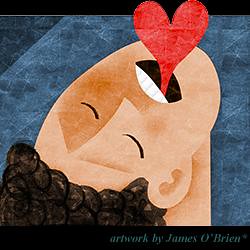BY TONY MICHELS
 (From Guilt & Pleasure 6: The Sound Issue)
(From Guilt & Pleasure 6: The Sound Issue)I then realized what my father had said earlier, in the ’50s: “You’re not Jewish, you’re not in the Mafia, you’re not black, and you’re not a hillbilly. Why the fuck do you think you can be in the music business?”
— Interview with Kim Fowley, Ugly Things magazine, 2001
During the early 1970s, Jonathan Richman and his band the Modern Lovers launched a small revolt against the rock world. In a period when rock music had become heavy, mellow, ponderous, and technical — sometimes all at once — the Modern Lovers stood for raw simplicity. They wanted nothing to do with meandering blues jams or ten-minute drum solos or trippy sound effects or forty-foot Marshall amps. Stark, energetic rock and roll was what they played. In his oddly nasal voice, Richman sang about girls, neon signs, highways, and other things he loved. He also sang about things he hated: long hair, bell-bottoms, emotional detachment, and drugs. Within Richman’s idiosyncratic mind, an unlikely assortment of bands — from the Velvet Underground to the Beach Boys to the Stooges to Question Mark and the Mysterians — seemed to coexist happily until he and the Modern Lovers reconfigured them into something better.
Writers and musicians alike have rightly credited Richman as a forerunner of the punk revolution. His minimalism, defiance toward everything “hip,” and knack for writing oddball lyrics (his observation that “Pablo Picasso was never called an asshole” will remain immortal) helped to establish the fundamentals of punk. The Sex Pistols, the Ramones, and many others have acknowledged their debt.
But Richman can also be viewed as one in a line of Jews who exercised a defining influence on rock and roll between the 1950s and 1970s. Jerry Leiber and Mike Stoller, Phil Spector, Bob Dylan, and Lou Reed (Richman’s main musical hero) immediately come to mind. True, most musicians of Jewish background — and quite likely Richman himself — would object to being classified as Jewish musicians. They didn’t set out to create Jewish music in whatever form. On the contrary: they usually embraced the music of other groups, especially black music. Why should they be pigeonholed by an accidental fact of birth? Yet one can’t help but notice, as Kim Fowley’s father did in the 1950s, the high number of Jews who populated the music business. And then one can’t help but wonder how their Jewish backgrounds might have been relevant to their music.
read the rest backstage>>
Thank you to Tony Michels, Shaina Feinberg at Guilt & Pleasure, and to Devon!




No comments:
Post a Comment